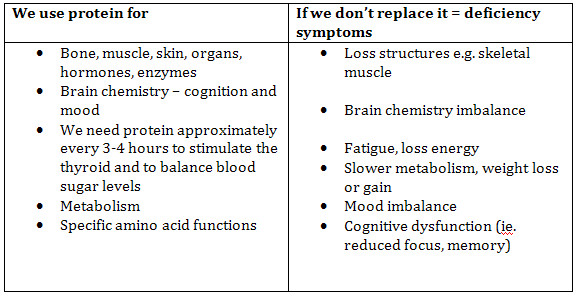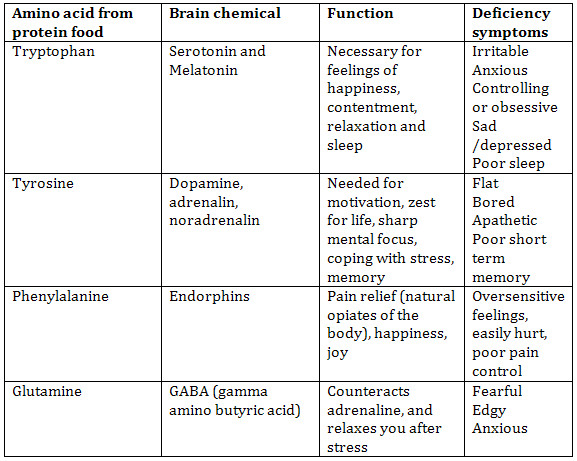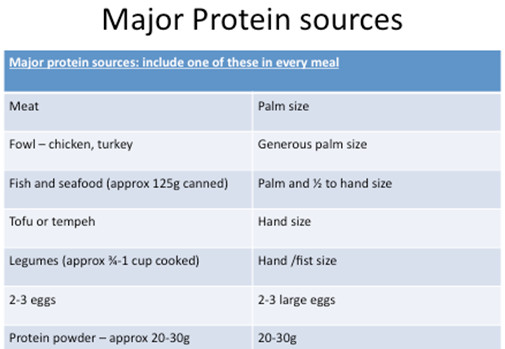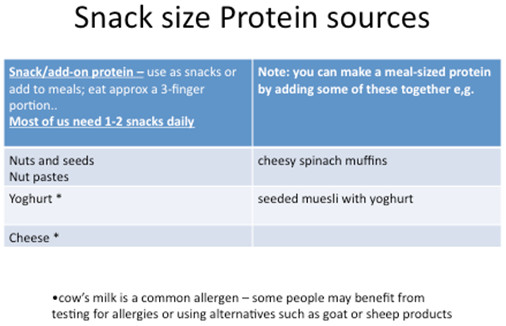by Linda Brown
Good carbohydrates fire up the brain with fuel.
Good fats construct receptors in brain cells and allow them to listen.
Good proteins convert to neurotransmitters and allow your brain cells to speak to each other. For this reason, protein is one of the most crucial nutrients for both mental function and mood.
We are made of protein, so we need it in certain quantities to maintain our structures, such as muscle, skin and bone.
Protein is broken down into tiny units of amino acids. Amino acids have specific individual functions; therefore it is crucial to have adequate amounts of all of them daily.
Amino acids are the main ingredients of the brain’s chemical cocktails.
Specific amino acids are converted (as the main ingredient) into specific neurotransmitters. For example, tryptophan converts to serotonin (required for us to feel happy); and tyrosine converts to dopamine (required for short term memory, coping, and motivation).
This is a brief list of some of the amino acids involved in good brain health:
This is a brief list of some of the amino acids involved in good brain health:
Protein requirements
Because we are made of protein, we use and lose approximately 1g per kilogram of body weight in urine every day. So if we’re peeing it out, we have to put it back in.
This daily protein requirement equals roughly a palm volume of animal protein OR a hand volume of vegetable protein per meal. That’s right x 3 times daily. If you are not eating this amount, you will most likely be protein deficient, and need to boost your dietary protein.
A physical indicator of protein sufficiency is the finger pulp test:
Finger Pulp Test
Squeeze your finger tip firmly for a few seconds; then release. The pressed tissue should bounce back immediately. If it takes a few seconds to spring back, you likely need to boost your dietary intake of protein.
Specific amino acid deficiency
Sometimes people use and lose (or simply require more) of particular amino acids. In this case, they experience deficiency symptoms, such as those listed above. The general daily protein quota may not supply enough of certain amino acids to replace what has been lost of what is required. This often occurs with stress. In this case, it is best to not only have enough dietary protein, but to consult a nutritionist who can identify and treat the deficiencies as well. Nutritionists can test plasma (or urine) amino acids and supplement individual amino acids.
Need more protein? Here’s how to get it!
Hankering for some protein?
These are some of my favourite ways to get sufficient protein…I hope you enjoy them too.
Bon Apetit!
The Anytime Omelet
2-3 eggs – beaten
I cup of chopped vegetables of your choice, eg. Tomato, grated zucchini, grated pumpkin, diced onion, herbs..
Olive oil for cooking
Optional cheese or smoked salmon strips
Heat the oil in a frying pan and saute onions and/or garlic on low to medium heat. Throw in the vegetables and stir. Add the eggs, put a lid on the saucepan and let it cook until the omelet is firm. Then, if you want to feel fancy you can add cheese or smoked salmon and grill it to perfection.
Not So “Seedy” Seeded Muesli
2 cups flaked or slivered almonds
1 cup sunflower seeds
1 cup pepitas
1/2 cup flaxseeds
1/2 cup sesame seeds
1/2 cup coconut flakes
Mix all ingredients on a baking or grill tray. Bake or grill for 15 minutes or until seeds are slightly crunchy. Cool and store. 1 serve = half a cup, serve with a little coconut milk, rice milk or goat’s yoghurt.
Trail mixes.. Mixing it up!
Cheeky Choc Berry
- 1 cup of mixed nuts and seeds of your choice: almonds, pepitas, sunflower, chia, sesame, hazelnuts, cashews, brazil nuts, pecans, walnuts etc (option to toast)
- 1/2 cup of organic Aclara coconut flakes
- 1/4 cup of goji berries OR Organic cranberries or blueberries (sweetened with apple juice)
- 1/4 cup of cocoa nibs (either plain if you do not want sugar, or slightly sweetened with panela if you can tolerate a little) OR naturally sweetened sugar free dark chocolate (such as 1 x bar of Well Naturally, or a few rows of the Cocoa Farm block), chopped
The Distinguished Gentleperson – pecan and cinnamon
- 1 cup of mixed nuts and seeds of your choice: almonds, pepitas, sunflower, chia, sesame, hazelnuts, cashews, brazil nuts, pecans, walnuts etc (option to toast) – I use mainly pecans
- 1/2 cup of organic Aclara coconut flakes
- sprinkle of cinnamon and nutmeg
- raisins or chopped dates
The Salty Dog
- 1 cup of mixed nuts and seeds of your choice: almonds, pepitas, sunflower, chia, sesame, hazelnuts, cashews, brazil nuts, pecans, walnuts etc (option to toast)
- 1/2 cup of organic Aclara coconut flakes
- 2 x Tbspn of dulse seaweed, finely diced
- a good sprinkle of Gomasio sesame seeds (from health store)
- eat raw OR lightly stir-fry for 2-3 minutes wit a dash of olive oil and tamari stirred through it
Cheesy Spinach Muffins
2 Eggs, beaten
100g of almond meal (this is about a generous metric cup)
30g of protein powder, such as whey protein isolate or pea protein
60g of Feta, crumbled (cow or goat – whichever is tolerated)
2 cups of baby spinach or chopped silverbeet
1/2 an onion, diced
100g of crushed walnuts
A pinch salt, paprika and cumin.
Mix the almond meal and protein powder together. Add in the feta, spinach, onion, walnuts and spices. Mix the egg into the dry mix to make dough. Spoon the mixture into muffin tins. Bake for 30 minutes in a moderate (about 180 degree) oven, or until cooked all the way through.
Serve with a tablespoon of guacamole on each if desired.
If you have a favourite “hi-protein” snack that works for you why not post it as a reply? Might just be that something special that works for us all :)
Linda




